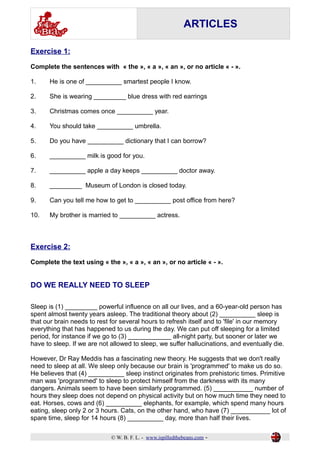More Related Content
More from Andreea Gabriela (8)
Articles
- 1. ARTICLES
Exercise 1:
Complete the sentences with « the », « a », « an », or no article « - ».
1. He is one of __________ smartest people I know.
2. She is wearing _________ blue dress with red earrings
3. Christmas comes once __________ year.
4. You should take __________ umbrella.
5. Do you have __________ dictionary that I can borrow?
6. __________ milk is good for you.
7. __________ apple a day keeps __________ doctor away.
8. _________ Museum of London is closed today.
9. Can you tell me how to get to __________ post office from here?
10. My brother is married to __________ actress.
Exercise 2:
Complete the text using « the », « a », « an », or no article « - ».
DO WE REALLY NEED TO SLEEP
Sleep is (1) _________ powerful influence on all our lives, and a 60-year-old person has
spent almost twenty years asleep. The traditional theory about (2) __________ sleep is
that our brain needs to rest for several hours to refresh itself and to 'file' in our memory
everything that has happened to us during the day. We can put off sleeping for a limited
period, for instance if we go to (3) ____________ all-night party, but sooner or later we
have to sleep. If we are not allowed to sleep, we suffer hallucinations, and eventually die.
However, Dr Ray Meddis has a fascinating new theory. He suggests that we don't really
need to sleep at all. We sleep only because our brain is 'programmed' to make us do so.
He believes that (4) __________ sleep instinct originates from prehistoric times. Primitive
man was 'programmed' to sleep to protect himself from the darkness with its many
dangers. Animals seem to have been similarly programmed. (5) ___________ number of
hours they sleep does not depend on physical activity but on how much time they need to
eat. Horses, cows and (6) __________ elephants, for example, which spend many hours
eating, sleep only 2 or 3 hours. Cats, on the other hand, who have (7) ___________ lot of
spare time, sleep for 14 hours (8) __________ day, more than half their lives.
© W. B. F. L. - www.ispilledthebeans.com -
- 2. ARTICLES
According to Dr Meddis, the 'tiredness' we feel at (9) ___________ end of (10)
__________ day is produced by a chemical mechanism in the brain which makes us
sleep. We are 'programmed' to feel 'tired' or 'sleepy' at (11) ___________ midnight, even if
we have spent the day relaxing on the beach or doing nothing. Dr Meddis believes that the
unpleasant symptoms we suffer when we don't sleep enough are not because we have not
rested but because we have disobeyed our brain's programming. (12) ___________
longer we don't sleep, (13) __________ worse we feel. But Dr Meddis believes that if
scientists could locate and 'turn off' the sleep mechanism in our brain that produces
tiredness, we could live completely normal and healthy lives without sleeping.
So is sleeping (14) ___________ waste of time? Well, even Dr Meddis does not deny (15)
___________ great psychological value of sleep, and he asks us, "if scientists invented
(16) ___________ pill which, if you took it, would keep you awake for ever, would you
take it?"
Exercise 3:
Some of the sentences are correct, and some have a word which should not be
there. If the sentence is correct, put a tick (P). If it is incorrect, cross the
unnecessary word out of the sentence and write it in the space.
A. My new job starts in the April. ...............................................
B. Tom was still working at the midnight. ...............................................
C. I drive past the hospital every morning. ...............................................
D. The life isn't fair sometimes. ...............................................
Exercise 4:
Put in the correct noun and decide if you need « the ».
Use these nouns: telescope, atom, piano, football and television.
1. Rutherford split _____________________ in 1911.
2. Brian and his friends played _____________________ in the park.
3. Sam is quite musical. She can play _____________________ .
4. The teenagers spend a lot of time watching _____________________ .
5. Galileo developed _____________________ for use in astronomy.
© W. B. F. L. - www.ispilledthebeans.com -

